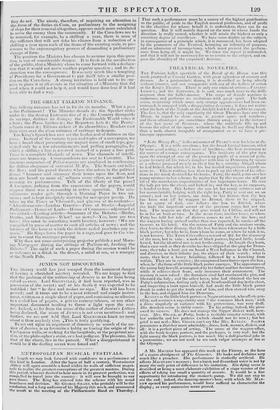"A Me Wrung Box," is the misnomer of PEA K
E'S new helium' at the Olympic. It is a trifle overdone ; but the broad farcical humour, aided by some good acting, eeeited roars of laughter,—the best testimony to the success of a coolie extravaganza. The incidents of the plot turn upon the attempt of one of the grown-up pupils of a reverend pedagogue to carry off his tutor's daughter with him to Demerara, by means of a scheme proposed merely to cheat him by a cunning Abigail whom he had bribed, but which he, in his Lotheaded impatience, eagerly assents to. This is nothing less than to pack up the object of his affections in the trunk destined for his boidis. Patty, the maid, gains over her young mistress to her scheme, by urging that by this means she will get rid of the unwelcome importuaities of her impetuous lover. Ile sees the lady get into the chest, and locked in ; and the key, as he supposes, is handed to him. But before she can let her young mistress out of her uncomfortable lodging %vith the right key, Patty is sent out on an errand ; and on her return, she finds, to her horror, that the box has been sent ofr by waggon to Bristol, there to be shipped. In an agony of fear, she follows the box to Bristol, where she finds the impatient owner of the precious cargo, but not the box. The waggon on that day goes round by Clifton, amid will not be in for an hour or two. Iii the mean time, another lover, to whom Patty has told her tale of (listless comes to ask for the box ; and the waggon having arrived earlier than was expected, he carries off the treasure to his hotel. On the return of Patty and the anxious swain, . they learn, to their dismay, that the box has been taken away by a little black porter ; but who he is, from whom he came, or where be took it to, is not known. The Town Crier offers a reward of :20/. for the discovery of the man, but in vitio : a mob of black porters, big and little, is collected, but the identical one is not forthcoming. At length they learn, that a case such as they describe has been shipped at the quay for Demerara; they take a boat, get on board a West Judi:mum in the Channel, and discover, to their infinite joy, the object of their search : what is more, they hear a heavy breathing, followed by a knocking from within. They are in ectasies ; the enraptured lover bursts open the box ; when, lo ! the form of the little black porter emerges. The appearance of the young lady herself; accompanied by her father and her favoured lover, while it relieves their fears, only increases their amazement. The mystery is soon solved : the fortunate rival had overheard the plot, and liberated the lady; and the other lover, who had obtained the box on Patty's information, finding only a dead Newfoundland dog in the chest, and suspecting a hoax upon himself, had made the little black porter drunk in order to get the truth out of him, and then stowed hini away in the box, and shipped him for Demerara. KEELEY as the little black porter—a Negro aristocrat, who affects gentility, and assumes a superiority over "the e0111111011 black men," with a dress singularly at variance with his pretensions, was very droll. His drunken scene is richly comic. To his acting, indeed, the piece owed its Success. Ile does not manage the Nigger dialect well, however. Mrs. oltGER, as Batty, looks a veritable country servant, with her umbrella and her pattens (which should not be new); but her grief is not real—Mrs. ORGER can't cry like Mrs. KEELEY. SALTER personates a thatcher most admirably—dress, look, manner, dialect, and all : it is a perfect piece of acting. The scene at the waggon-office, with the book-keeper, porters, and the packages, is very real: but the fight among the black porters, is too much like a dull practical joke in a pantomime; we are not used to see such vulgar attempts at fun at the Olympic.


















 Previous page
Previous page